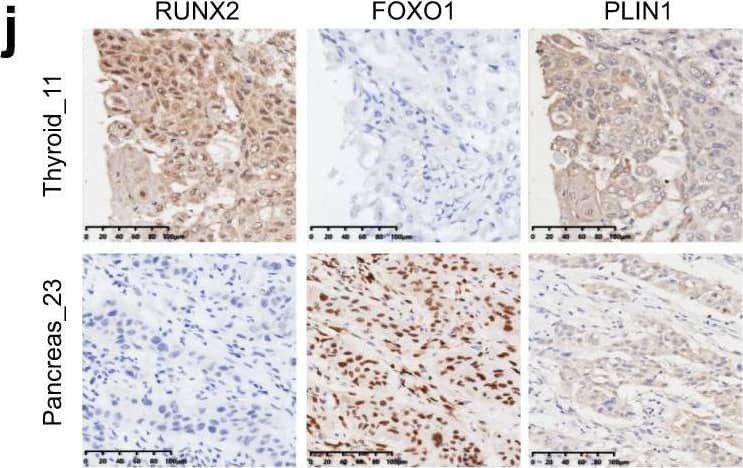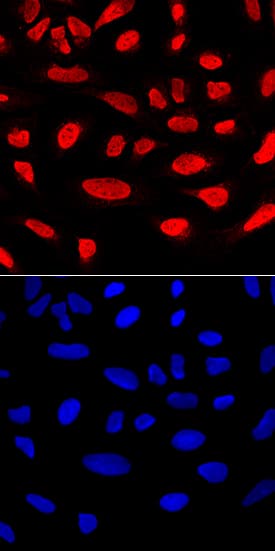Human RUNX2/CBFA1 Antibody
R&D Systems, part of Bio-Techne | Catalog # MAB2006

Key Product Details
Species Reactivity
Validated:
Human
Cited:
Human, Mouse
Applications
Validated:
Immunocytochemistry
Cited:
Flow Cytometry, Immunocytochemistry, Immunohistochemistry, Immunohistochemistry-Frozen, Immunohistochemistry-Paraffin, Western Blot
Label
Unconjugated
Antibody Source
Monoclonal Rat IgG2B Clone # 232902
Product Specifications
Immunogen
E. coli-derived recombinant human RUNX2/CBFA1 isoform 2
Lys233-Tyr418
Accession # Q13950
Lys233-Tyr418
Accession # Q13950
Specificity
Detects human RUNX2/CBFA1.
Clonality
Monoclonal
Host
Rat
Isotype
IgG2B
Scientific Data Images for Human RUNX2/CBFA1 Antibody
RUNX2/CBFA1 in U2OS Human Cell Line.
RUNX2/CBFA1 was detected in immersion fixed U2OS human osteosarcoma cell line using Rat Anti-Human RUNX2/CBFA1 Monoclonal Antibody (Catalog # MAB2006) at 10 µg/mL for 3 hours at room temperature. Cells were stained using the NorthernLights™ 557-conjugated Anti-Rat IgG Secondary Antibody (red, upper panel; Catalog # NL013) and counterstained with DAPI (blue, lower panel). Specific staining was localized to nuclei. View our protocol for Fluorescent ICC Staining of Cells on Coverslips.Detection of Human RUNX2/CBFA1 by Immunohistochemistry
Proteomic differences of common SCCs&rare SCCs.j Immunohistochemistry staining for RUNX2, FOXO1,&PLIN1 expression in rare SCCs (one case of thyroid SCC&one case of pancreatic SCC) was concordant with the mass spectrometry findings. Scale bar, 100 μm. Image collected & cropped by CiteAb from the following open publication (https://pubmed.ncbi.nlm.nih.gov/35851595), licensed under a CC-BY license. Not internally tested by R&D Systems.Applications for Human RUNX2/CBFA1 Antibody
Application
Recommended Usage
Immunocytochemistry
8-25 µg/mL
Sample: Immersion fixed U2OS human osteosarcoma cell line
Sample: Immersion fixed U2OS human osteosarcoma cell line
Reviewed Applications
Read 3 reviews rated 4 using MAB2006 in the following applications:
Formulation, Preparation, and Storage
Purification
Protein A or G purified from hybridoma culture supernatant
Reconstitution
Reconstitute at 0.5 mg/mL in sterile PBS. For liquid material, refer to CoA for concentration.
Formulation
Lyophilized from a 0.2 μm filtered solution in PBS with Trehalose. *Small pack size (SP) is supplied either lyophilized or as a 0.2 µm filtered solution in PBS.
Shipping
Lyophilized product is shipped at ambient temperature. Liquid small pack size (-SP) is shipped with polar packs. Upon receipt, store immediately at the temperature recommended below.
Stability & Storage
Use a manual defrost freezer and avoid repeated freeze-thaw cycles.
- 12 months from date of receipt, -20 to -70 °C as supplied.
- 1 month, 2 to 8 °C under sterile conditions after reconstitution.
- 6 months, -20 to -70 °C under sterile conditions after reconstitution.
Background: RUNX2/CBFA1
CBFA1, also called runt-related transcription factor 2 (RUNX2), is an essential transcription factor for the regulation of osteoblast differentiation (1). The CBFA1 gene potentially encodes several proteins that differ in their N-terminal sequences and transactivation capacities (2).
References
- Ducy, P. et al. (1997) Cell 89:747.
- Xiao, Z.S. et al. (1998) Gene 214:187.
- Sato, M. et al. (1998) Oncogene 17:1517.
Long Name
Runt-related Transcription Factor 2
Alternate Names
CBFA1
Entrez Gene IDs
860 (Human)
Gene Symbol
RUNX2
UniProt
Additional RUNX2/CBFA1 Products
Product Documents for Human RUNX2/CBFA1 Antibody
Product Specific Notices for Human RUNX2/CBFA1 Antibody
For research use only
